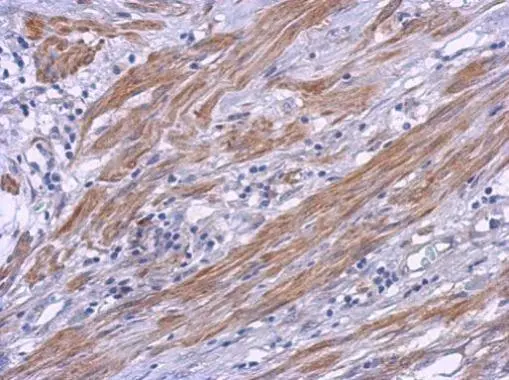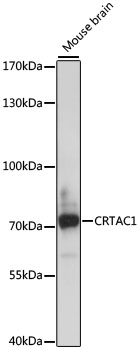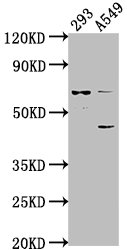
Immunohistochemical analysis of paraffin-embedded human gastric cancer, using CRTAC1(GTX119558) antibody at 1:500 dilution.
Antigen Retrieval: Trilogy? (EDTA based, pH 8.0) buffer, 15min
CRTAC1 antibody
GTX119558
ApplicationsImmunoHistoChemistry, ImmunoHistoChemistry Paraffin
Product group Antibodies
ReactivityHuman
TargetCRTAC1
Overview
- SupplierGeneTex
- Product NameCRTAC1 antibody
- Delivery Days Customer9
- Application Supplier NoteIHC-P: 1:100-1:1000. *Optimal dilutions/concentrations should be determined by the researcher.Not tested in other applications.
- ApplicationsImmunoHistoChemistry, ImmunoHistoChemistry Paraffin
- CertificationResearch Use Only
- ClonalityPolyclonal
- Concentration1 mg/ml
- ConjugateUnconjugated
- Gene ID55118
- Target nameCRTAC1
- Target descriptioncartilage acidic protein 1
- Target synonymsASPIC, ASPIC1, CEP-68, CEP68, LOTUS, cartilage acidic protein 1, acidic secreted protein in cartilage, chondrocyte expressed protein 68 kDa CEP-68
- HostRabbit
- IsotypeIgG
- Protein IDQ9NQ79
- Protein NameCartilage acidic protein 1
- Scientific DescriptionThis gene encodes a glycosylated extracellular matrix protein that is found in the interterritorial matrix of articular deep zone cartilage. This protein is used as a marker to distinguish chondrocytes from osteoblasts and mesenchymal stem cells in culture. The presence of FG-GAP motifs and an RGD integrin-binding motif suggests that this protein may be involved in cell-cell or cell-matrix interactions. Copy number alterations in this gene have been observed in neurofibromatosis type 1-associated glomus tumors. Alternative splicing results in multiple transcript variants. [provided by RefSeq, Aug 2011]
- ReactivityHuman
- Storage Instruction-20°C or -80°C,2°C to 8°C
- UNSPSC41116161





